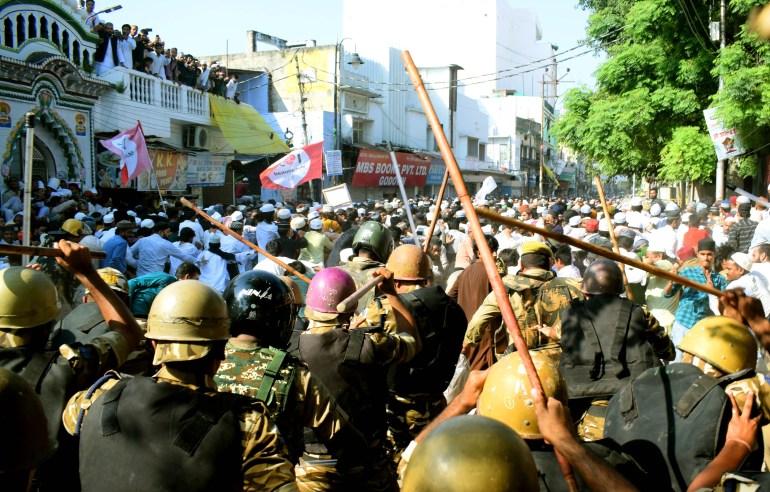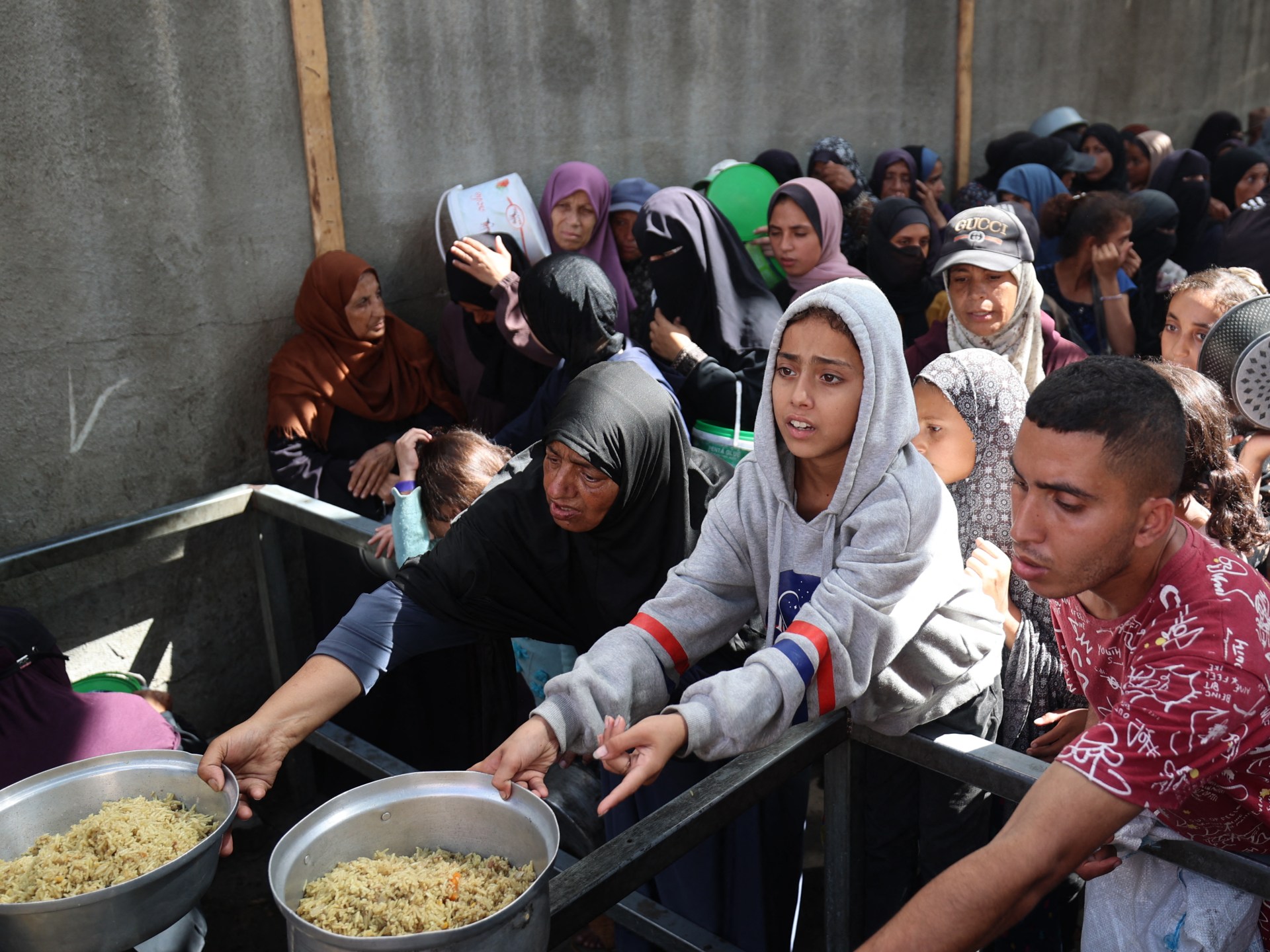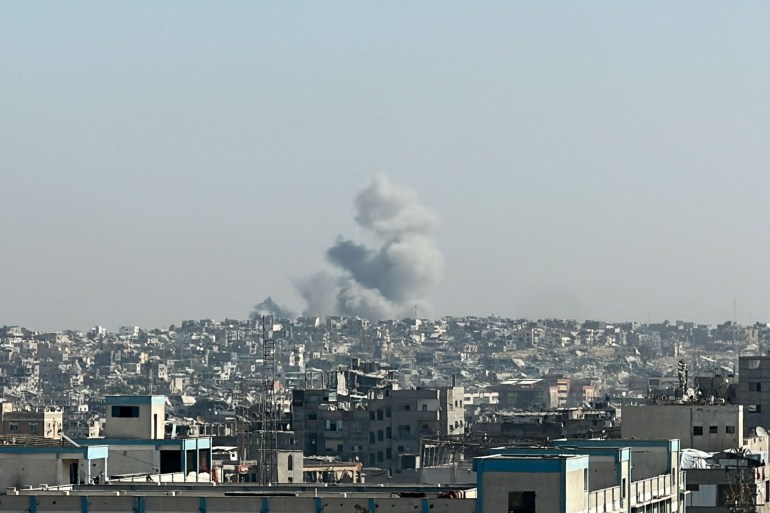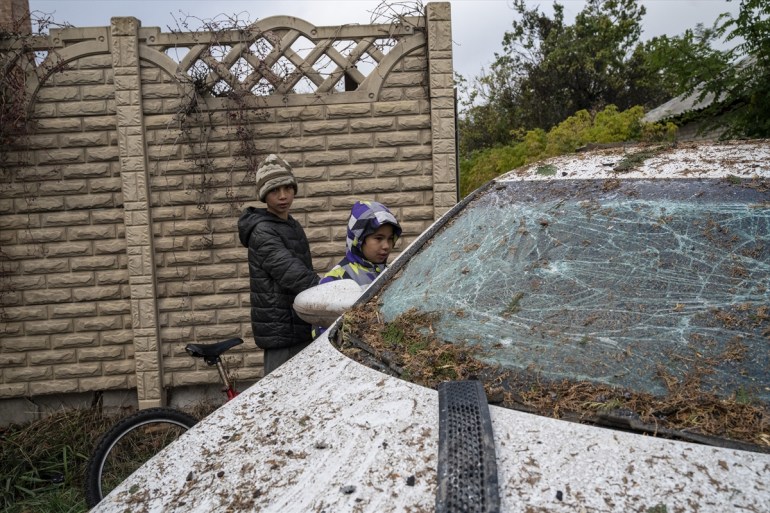Lucknow, India – On the evening of September 4, an illuminated signboard lit up a predominantly Muslim neighbourhood in Kanpur, an industrial town in India’s northern state of Uttar Pradesh.
The signboard said: “I love Muhammad” – with a red heart standing in for the word, love.
Recommended Stories
list of 4 itemsend of list
It was the first time the mainly working-class residents in Kanpur’s Syed Nagar had put up such a sign as part of the decorations as they joined millions of Muslims around the world to celebrate Prophet Muhammad’s birthday.
The day, marked as Eid Milad-un-Nabi across South Asia, involves the faithful organising religious gatherings, Quran recitations, and sermons about the prophet’s life and teachings. At some places, the celebrations include mass processions, with people carrying posters to express their love and reverence for the prophet.
In Syed Nagar, however, as soon as the words glowed, a group of Hindu men swooped in, objecting to the celebration. Police were called in, and following a ruckus that lasted hours, the signboard was removed late that night.
Charges related to promoting enmity between different religious groups, as well as deliberate and malicious acts intended to outrage the religious feelings of another community, were filed against nine Muslim men and 15 unidentified people from Syed Nagar. No arrests have been made so far.

Mohit Bajpayee, a Syed Nagar resident affiliated with a Hindu group named Sri Ramnavmi Samiti, said he had no objection to the text, ‘I love Muhammad’, but to the placement of the signboard at a place used by them for a Hindu festival.
“All religions have equal rights under the constitution,” he told Al Jazeera. “But the sign was put up at a location where our Ram Navami decorations are usually displayed. Everyone has a right to follow their religion, but new traditions should not be started in new locations.”
But the Muslim residents of Syed Nagar say the signboard was put up at a public place they converged at every year for the prophet’s birth anniversary.
“We had official permission for the decorations. Everyone has the right to practise their religion under the constitution,” said a 28-year-old resident who is one of those charged, unwilling to reveal his identity over fears of further action by the government.
MA Khan, the lawyer for the accused in Kanpur, told Al Jazeera that the Muslim men were also accused of tearing a banner of the Hindu community during the Eid Milad-un-Nabi procession on September 5.
“Many of those named were not even present in the procession,” he said.
‘Disturbing communal harmony’
Uttar Pradesh is home to 38 million Muslims – more than the entire population of Saudi Arabia – comprising nearly 20 percent of India’s most populous state. Since 2017, the politically crucial state has been governed by Yogi Adityanath, a hardline Hindu monk known for his anti-Muslim speech and policies, and a prominent politician from Prime Minister Narendra Modi’s Hindu majoritarian Bharatiya Janata Party (BJP).
Days later, the spark from Kanpur ignited a fire some 270km (168 miles) away, in another Uttar Pradesh town called Bareilly – headquarters of the Barelvi sect of Sunni Muslims, who number between 200 million to 300 million across the world.
On September 10, the state police registered a first information report (FIR) against nine Muslims in Bareilly, including a religious scholar, accusing them of “disturbing communal harmony” and starting a “new tradition” that threatened public order.

On September 21, Maulana Tauqeer Raza Khan, chief of a Muslim group called Ittehad-e-Millat Council (IMC) and descendant of Imam Ahmed Raza Khan, the founder of the Barelvi sect, announced a protest over the FIRs filed in Bareilly and Kanpur, and urged his supporters to gather at a ground after Friday prayers on September 26 to denounce the police action.
The district administration denied Khan permission for the rally.
On September 25, the IMC issued a statement asking people not to gather for the protest. But hours later, Khan’s supporters allegedly circulated a social media message, claiming the IMC statement was fake and aimed at defaming the Muslim body.
The next day, thousands of Muslims assembled near a famous Muslim shrine in Bareilly after the Friday prayers, holding “I love Muhammad” posters and raising slogans against the police for their action in Kanpur.
District authorities alleged that the march was unauthorised and accused some participants of pelting stones at the police and vandalising public property. The police responded with a baton charge, and arrested Khan and dozens of others, as authorities shut down the internet in the town.

In a video message recorded before his arrest, Khan said the crackdown was a targeted suppression of religious expression. “Attempts to suppress our religious sentiments will backfire,” he warned.
A day later, while speaking at an event in the state capital, Lucknow, Chief Minister Adityanath condemned the Bareilly unrest as a “well-orchestrated attempt” to disturb social harmony.
“Sometimes, people are not able to shun their bad habits easily. For that, some denting-painting is required … You saw that in Bareilly yesterday. A maulana [Muslim scholar] forgot who is in power,” he said in Hindi, without naming anyone.
The “denting-painting” soon followed, as has been the pattern with Adityanath’s crackdown on Muslims accused of disrupting public order. A banquet hall belonging to one of the accused was bulldozed by the authorities in Bareilly.
‘Government wants to instil fear’
Demolition of homes and commercial properties belonging to Muslims accused of a range of crimes has become a common practicein Uttar Pradesh and other BJP-ruled states, despite India’s top court recently banning what it called the “bulldozer justice”. Rights groups say such demolitions are a form of extralegal punishment that bypasses judicial processes and devastates families economically.
While the Uttar Pradesh government claimed the demolitions in Bareilly targeted illegally-constructed buildings, the timing and targets suggest a clear strategy of intimidation.
“Police are registering cases against Muslims across the nation to suppress their legitimate protests … The BJP government wants to instil fear so Muslims lose the courage to speak for their religious and fundamental rights,” Sumaiya Rana, daughter of the famous Urdu poet late Munawwar Rana, told Al Jazeera.
Rana herself organised a protest outside the state assembly building in Lucknow, where more than a dozen demonstrators holding “I love Muhammad” placards were briefly detained by the police.

The Association for Protection of Civil Rights (APCR), a rights group, says at least 22 FIRs have been filed across India in connection with the Muslim campaign, naming more than 2,500 individuals, with at least 89 arrested in Bareilly so far.
“Authorities have treated a slogan expressing love for the prophet as a criminal act and described it as provocative,” APCR secretary Nadeem Khan told Al Jazeera. “In many cases, the administration violated due process in registering cases and demolishing the properties of the accused, which has severe social and economic impacts on Muslim communities.”
SQR Ilyasi, a member of the All India Muslim Personal Law Board, a prominent Muslim body, stressed that peaceful protest is not illegal for any community in India. “Expressing love for the prophet is our right,” he told Al Jazeera.
Activist Vandana Mishra of the People’s Union for Civil Liberties, a rights group, said the authorities frequently allow the Hindu community to “raise religious slogans freely, while the minority faces arrest for expressing love for the prophet”.
“This contravenes the secular and democratic ethos of our constitution,” she told Al Jazeera.
Opposition parties have also criticised the Uttar Pradesh government’s actions.
The Samajwadi Party, one of the state’s biggest political forces, said it attempted to send a delegation to Bareilly to meet the victims of the police crackdown, but claimed its members were prevented. “The government talks of democracy but acts in complete disregard of it,” the leader of the opposition in the Uttar Pradesh Assembly, Mata Prasad Pandey, told reporters in Lucknow.
Lawyer Zia Jillani, who recently visited Bareilly and is representing some of the accused, told Al Jazeera that most of those arrested or facing charges “belong to the marginalised sections of society and earn on a daily wage basis”.
“For them, due to their financial incapability, pursuing and fighting legal cases against the injustices inflicted upon them is an unbearable task,” he said.
“This kind of hate politics preys on the poor, taking advantage of their vulnerability while ignoring justice and accountability.”










